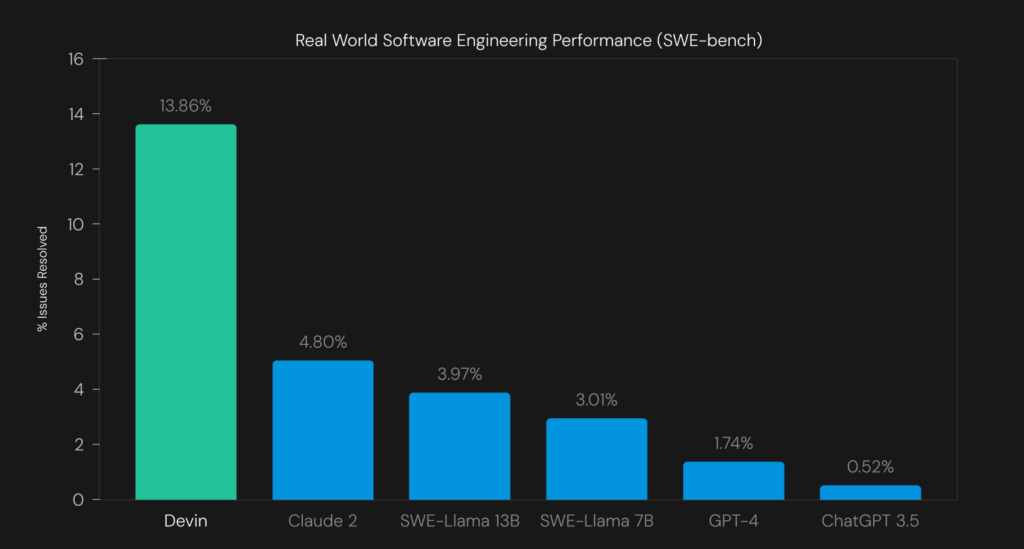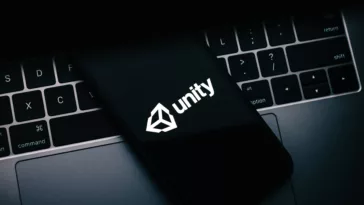Cognition, the Peter Thiel-backed AI startup, has unleashed "Devin" – a groundbreaking AI software engineer that promises to shake up development as we know it. Forget mere code generation like Copilot; Devin claims it can autonomously handle entire projects, from conception to deployment, and even moonlight on Upwork. Is this the future of coding – AI as a tireless teammate? Let's dive in!
The Shift: From Code Assistant to AI Colleague
Coding assistants powered by AI are nothing new, but the new generative AI stands out with its ability to take ownership of projects. Instead of simply regurgitating code snippets based on prompts, the latter delves into the core of a problem, decomposes it into manageable tasks, and then formulates a step-by-step execution plan. It utilizes a sandboxed virtual environment equipped with common developer tools – its own shell, code editor, and browser – to interact with codebases and APIs just like a human developer would.
This enables Devin to not only write code but also identify and rectify errors within its own output, a crucial feature for ensuring the overall quality and reliability of the project. The AI's self-debugging capabilities can range from pinpointing syntax errors to identifying logical flaws or inefficiencies in the written code. If it encounters an obstacle it can't overcome on its own, it can intelligently request clarification or assistance from the human user, facilitating a seamless collaboration throughout the development process.
What Can Devin Do?
Let's get concrete. In Cognition's demos, Devin shows impressive versatility:
- End-to-End App/Website Deployment and Improvement: The new generative AI can take an initial concept and shepherd it all the way to a fully functional app or website. This includes tasks like building user interfaces, crafting back-end logic, integrating with databases or APIs, and even deploying the finished product to a cloud server. Imagine sketching out a basic idea for a new productivity tool, then having it translate that vision into a polished, deployable web application – all within the same environment.
- Ruthless Bug Squashing: Devin goes beyond simply writing code; it actively analyzes the code it generates to ferret out bugs and potential errors. This can include syntax errors, logical mistakes, or inefficiencies in the code's structure. It can not only pinpoint the problematic sections but also attempt to suggest fixes, saving developers valuable time and frustration.
- Advanced Tasks: Need to fine-tune a large language model for a specific purpose? Devin can take a base model and customize it to understand and respond to a particular domain or dataset. For instance, imagine a game developer wanting to create an AI-powered in-game dialogue system. Devin could ingest a massive dataset of fantasy fiction writing and fine-tune a large language model to generate natural, engaging dialogue for the game's characters.
- Adaptability and Learning: The new AI tool is not a one-trick pony. It can continuously learn and adapt to new technologies and tools. Whether it's encountering a new programming language, a novel framework, or an unfamiliar API, Devin can absorb information from online resources and documentation to expand its skillset. This allows Devin to stay relevant in the ever-evolving world of software development.
- Upwork Success: This isn't just a lab project – Devin has demonstrably tackled real-world coding challenges on platforms like Upwork. Imagine a small business needing a quick website refresh. Devin could take their requirements, design a basic website layout, and write the necessary code to bring it to life. This ability to handle freelance projects shows Devin's potential to democratize access to high-quality coding expertise.
Error Handling: Limits and Solutions No AI is perfect, so let's illustrate how Devin tackles the unexpected. Imagine it hits a compilation error. Could it offer multiple solutions, rank them based on confidence, and gracefully request human help to decide when truly stumped? This builds trust and shows its boundaries.
Beating Benchmarks
The SWE-Bench test, where AIs tackle open-source GitHub issues, is a good gauge. Devin solved 13.86% of problems on its own, crushing Claude 2, SWE-Llama-13b, and even the mighty GPT-4, which all needed more hand-holding.

The Secret Sauce: How Does It Work?
While the specifics of Devin's tech are under wraps, Cognition hints at breakthroughs in "long-term reasoning and planning." Think of it as the ability to think multiple steps ahead, staying on target throughout a project, and potentially work with multiple programming languages. This sets it apart from code generation tools that are better at isolated tasks.
Impact on Industries: Is Gaming the Next Frontier?
Devin's potential extends far beyond general software development. Game studios, with their often-tight budgets and relentless deadlines, could see huge gains:
- Procedural Creation: Imagine automating the creation of vast landscapes, repetitive textures, or even basic 3D assets. This would free up valuable time and resources for artists to focus on crafting truly unique and immersive game worlds. Devin could be particularly adept at generating procedural content that adheres to a specific art style, ensuring a cohesive visual experience.
- Testing and Optimization: Testing a complex game can be a monumental task, often involving repetitive and tedious processes. Devin could be a tireless AI tester, meticulously combing through the game world to identify bugs, glitches, and performance bottlenecks. It could prioritize these issues based on severity and potential impact on the player experience, allowing human QA testers to focus on higher-level testing strategies.
- Indie Dev Empowerment: Indie studios often lack the manpower and resources of their AAA counterparts. Devin could act as a virtual coding teammate for these smaller studios, shouldering much of the development burden. This could allow them to create more ambitious and polished games, potentially leveling the playing field in the competitive gaming industry.
Ethics: The AI and Work Debate
The rise of powerful workplace AI always sparks discussion. It's vital to address:
- Job Concerns: Acknowledge the fear of AI replacement, but cite experts who see this as AI-human partnership at its best.
- Creativity's Value: Will Devin churn out generic code? Underscore that human ingenuity will always be needed for the truly groundbreaking.
- The Bias Problem: Could Devin make biased decisions based on its training data? Is Cognition actively countering this?
Is This Just for Coding?
Cognition boldly claims coding is "just the beginning." Could we see similar AI workers in fields like design, analytics, or even game asset creation? With $21 million raised, they're certainly swinging for the fences.
Get In Line: Access and Availability
As of now, Devin isn't public. Early access is rolling out to selected users, so if you're intrigued and want to streamline your engineering, Cognition invites you to reach out. The wider release will likely follow.
Final Thoughts
Devin has the potential to be transformative, especially for teams juggling tight deadlines and complex projects. Will it replace human devs? Unlikely. But the idea of AI stepping in for the grunt work while humans focus on the high-level, creative elements is tantalizing. This is one to keep on your radar, folks!




